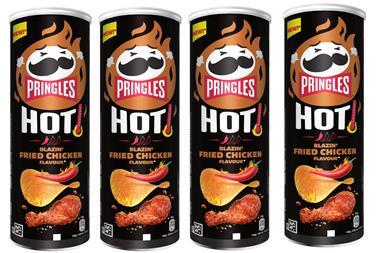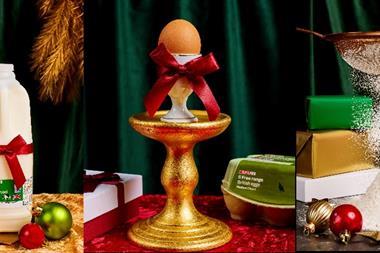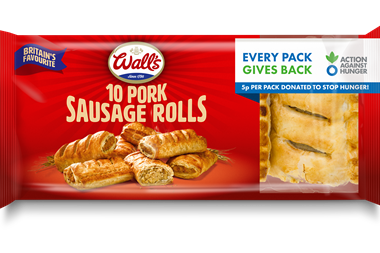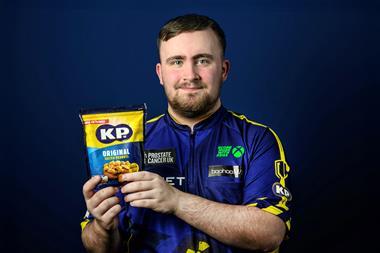Three years ago juice looked set to take over from cola as the largest sub-category in soft drinks. Several years of continued growth saw the sub-category in a strong position in the convenience sector. However, 2009 was a different story altogether. The market fell for the second consecutive year as juice drinks witnessed a 4% decline in value sales and pure juice dropped by 10% (Nielsen MAT December 2009).
Price-conscious consumers switching to cheaper sub-categories was the reason given for the slump. According to Nielsen figures, juice drinks actually benefitted from the switching around, with consumers trading down from the more expensive pure juice sub-category, but this was negated by even more consumers moving to carbonates.
Even though the economy is showing tentative signs of bouncing back, juice manufacturers have decided that the market, and in some cases individual brands, must adapt to thrive.
Granini managing director Steve Wheatley believes that the juices market needs to be invigorated to help it recover from its current slump. "Even though the market is actually doing okay compared with others, there still needs to be a revitalisation for juices," he says. "What major brands such as Tropicana have done is fine, such as introducing new variants and flavours, but the market now needs new brands that emphasise premium."
Princes Soft Drinks marketing director Graham Breed agrees with this sentiment and says that manufacturers have been looking to expand the number of consumption occasions for the sub-category. "Retailers and manufacturers have worked hard to develop the juices category expanding usage beyond the breakfast table and evolving marketing beyond the five-a-day health message. This has helped pave the way for long-term market growth.
"The economic climate, combined with poor weather, has had an impact on total category sales, but the long-term prospects remain bright," adds Breed. "Latest 12-week data from Nielsen indicates that the market has stabilised (+9%) and we expect to see slow but steady growth during 2010."
Sunny Delight area manager Richard Baragawanath says that the recession has prompted his brand to adapt in order to survive. "There has been a dramatic shift in behaviour with consumers trading down from expensive branded juice and juice drinks to cheaper brands, own label and ambient products," he says. "We are launching a 15% juice drink with a lower rrp, which will appeal to the upsurge in customers looking to make savings on their shopping. This will replace the higher juice variant we launched last year. When the market conditions are right, we will re-introduce the high juice content variant."
Rubicon brand manager Ben Anderson says it has combated changes in the economic climate by tying in with an event. "Working with Mango Week in 2009 saw sales for the four-week period leading up to it increase by 142% compared with the same period of 2008," says Anderson. "Retailers looking to boost sales of juices should consider cross-promoting with a national or local event. Even in a downturn, it creates brand recognition for a product or category."
With the juices market in the doldrums and floor space in stores at a premium, retailers may have to decide if they should prioritise chilled or ambient juices.
Breed believes that the economic downturn has resulted in a focus on ambient ranges. "Ambient juice is well-placed to capitalise on the recent change in consumer spending habits offering value, convenience, quality and increasing variety," he says. "It's also a clear winner for independent retailers where chiller space is at a premium.
"We've seen some shoppers turning their backs entirely on chilled juices as they rediscover the benefits of ambient juice," adds Breed. "We've also seen some consumers shift towards repertoire buying choosing different products for different occasions such as ambient for everyday use and top-up shopping and dipping into chilled for a treat."
Del Monte vice-president of operations Frans Van Melis agrees that ambient variants have benefitted from the recession. "Consumers shift towards repertoire buying in tough economic times ambient for everyday use, and chilled for a treat." he says. "Our research showed that mums are buying up to 10 litres of juice a week, so premium ambient options will allow them to stock up cost-effectively without having to compromise on quality. We believe that there is strong potential for growth in this area."
Pepsico juice marketing director Simon Michaelides says that the on-the-go and take-home markets should be provided for with a slight bias to the latter.
"Three-fifths of fruit juice value currently comes from take-home products," he says. "This makes them an absolute must-stock for convenience stores and independent retailers. On-the-go formats are also becoming increasingly important as consumers seek the same healthy refreshment, but in a more convenient format for immediate consumption on the move."
He adds that retailers should consider stocking a wide range of flavours to cash in on the growth of other juice occasions.
"More than half (51%) of all juice is consumed outside of the breakfast occasion, so it's important for retailers to extend their offerings to capitalise on incremental sales opportunities throughout the day," says Michaelides. "Recently, Tropicana has launched two new variants in on-the-go formats that originally existed only in take-home sizes."
However, Anderson believes that the on-the-go market should be the priority for juices in the impulse sector. "The single-serve size is still dominant in the convenience store market," he says. "Consumers who shop in convenience stores prefer the handy, portable size so it's important that retailers stock it."
If the juice market took a small drop in 2009, then smoothies went into freefall. According to Nielsen, the sub-category saw a 26% drop in value sales in the impulse sector compared with the previous year. This was the second year in a row that the sector saw a decline of more than 20% and it has left a sector, which only five years ago was helping to drive the soft drinks market, in disarray.
Innocent smoothies commercial director Dave Pickup says that a lot of consumers moved away from smoothies when the recession hit, causing the downturn in sales. "People were watching the pennies and luxury items such as smoothies were the first to suffer," he says. "Three years ago, price was fourth on the list of consumer priorities; now it's first."
Pickup adds that besides consumers watching what they spend, retailers became nervous about stocking chilled smoothies, leading to reduced availability. "Shelf-life is a big concern to convenience store retailers as they are wary of being left with out-of-date stock," he says.
In order to combat this perception, Pickup decided to educate retailers about the market and its potential. "Convenience is an underdeveloped channel for smoothies so it is important that store owners know how lucrative it can be," he says.
"Our vans sales teams visited stores on a regular basis and not just to make the sale. We wanted to be available to answer every question they might have about the market even after they've bought the product."
Pickup says that although the market suffered in 2009, it has seen a slight resurgence in the first part of the year. "Sales of smoothies are up 15% for the 12-week period to April 17 compared with the same period the previous year (Nielsen)," he says. "So there are positive signs for the market if the growth over the past few months continues."
Innocent also tweaked its range to suit the economic climate and to allay fears over waste. "We introduced more pricemarked packs to offer a better price to consumers and reduced the number of 1ltr cartons in an outer from eight to four so that retailers would feel more comfortable stocking them," adds Pickup.
Anderson believes that the current success of the juices market can be indirectly attributed to smoothies. "A lot of people traded from smoothies to juice as they saw them as a less expensive treat," he says. "Also, the smoothie market introduced consumers to new flavours that are now staples of the juice market, it's just unfortunate that it hasn't been able to sustain that initial progress."
Price-conscious consumers switching to cheaper sub-categories was the reason given for the slump. According to Nielsen figures, juice drinks actually benefitted from the switching around, with consumers trading down from the more expensive pure juice sub-category, but this was negated by even more consumers moving to carbonates.
Even though the economy is showing tentative signs of bouncing back, juice manufacturers have decided that the market, and in some cases individual brands, must adapt to thrive.
Granini managing director Steve Wheatley believes that the juices market needs to be invigorated to help it recover from its current slump. "Even though the market is actually doing okay compared with others, there still needs to be a revitalisation for juices," he says. "What major brands such as Tropicana have done is fine, such as introducing new variants and flavours, but the market now needs new brands that emphasise premium."
Princes Soft Drinks marketing director Graham Breed agrees with this sentiment and says that manufacturers have been looking to expand the number of consumption occasions for the sub-category. "Retailers and manufacturers have worked hard to develop the juices category expanding usage beyond the breakfast table and evolving marketing beyond the five-a-day health message. This has helped pave the way for long-term market growth.
"The economic climate, combined with poor weather, has had an impact on total category sales, but the long-term prospects remain bright," adds Breed. "Latest 12-week data from Nielsen indicates that the market has stabilised (+9%) and we expect to see slow but steady growth during 2010."
Sunny Delight area manager Richard Baragawanath says that the recession has prompted his brand to adapt in order to survive. "There has been a dramatic shift in behaviour with consumers trading down from expensive branded juice and juice drinks to cheaper brands, own label and ambient products," he says. "We are launching a 15% juice drink with a lower rrp, which will appeal to the upsurge in customers looking to make savings on their shopping. This will replace the higher juice variant we launched last year. When the market conditions are right, we will re-introduce the high juice content variant."
Rubicon brand manager Ben Anderson says it has combated changes in the economic climate by tying in with an event. "Working with Mango Week in 2009 saw sales for the four-week period leading up to it increase by 142% compared with the same period of 2008," says Anderson. "Retailers looking to boost sales of juices should consider cross-promoting with a national or local event. Even in a downturn, it creates brand recognition for a product or category."
With the juices market in the doldrums and floor space in stores at a premium, retailers may have to decide if they should prioritise chilled or ambient juices.
Breed believes that the economic downturn has resulted in a focus on ambient ranges. "Ambient juice is well-placed to capitalise on the recent change in consumer spending habits offering value, convenience, quality and increasing variety," he says. "It's also a clear winner for independent retailers where chiller space is at a premium.
"We've seen some shoppers turning their backs entirely on chilled juices as they rediscover the benefits of ambient juice," adds Breed. "We've also seen some consumers shift towards repertoire buying choosing different products for different occasions such as ambient for everyday use and top-up shopping and dipping into chilled for a treat."
Del Monte vice-president of operations Frans Van Melis agrees that ambient variants have benefitted from the recession. "Consumers shift towards repertoire buying in tough economic times ambient for everyday use, and chilled for a treat." he says. "Our research showed that mums are buying up to 10 litres of juice a week, so premium ambient options will allow them to stock up cost-effectively without having to compromise on quality. We believe that there is strong potential for growth in this area."
Pepsico juice marketing director Simon Michaelides says that the on-the-go and take-home markets should be provided for with a slight bias to the latter.
"Three-fifths of fruit juice value currently comes from take-home products," he says. "This makes them an absolute must-stock for convenience stores and independent retailers. On-the-go formats are also becoming increasingly important as consumers seek the same healthy refreshment, but in a more convenient format for immediate consumption on the move."
He adds that retailers should consider stocking a wide range of flavours to cash in on the growth of other juice occasions.
"More than half (51%) of all juice is consumed outside of the breakfast occasion, so it's important for retailers to extend their offerings to capitalise on incremental sales opportunities throughout the day," says Michaelides. "Recently, Tropicana has launched two new variants in on-the-go formats that originally existed only in take-home sizes."
However, Anderson believes that the on-the-go market should be the priority for juices in the impulse sector. "The single-serve size is still dominant in the convenience store market," he says. "Consumers who shop in convenience stores prefer the handy, portable size so it's important that retailers stock it."
If the juice market took a small drop in 2009, then smoothies went into freefall. According to Nielsen, the sub-category saw a 26% drop in value sales in the impulse sector compared with the previous year. This was the second year in a row that the sector saw a decline of more than 20% and it has left a sector, which only five years ago was helping to drive the soft drinks market, in disarray.
Innocent smoothies commercial director Dave Pickup says that a lot of consumers moved away from smoothies when the recession hit, causing the downturn in sales. "People were watching the pennies and luxury items such as smoothies were the first to suffer," he says. "Three years ago, price was fourth on the list of consumer priorities; now it's first."
Pickup adds that besides consumers watching what they spend, retailers became nervous about stocking chilled smoothies, leading to reduced availability. "Shelf-life is a big concern to convenience store retailers as they are wary of being left with out-of-date stock," he says.
In order to combat this perception, Pickup decided to educate retailers about the market and its potential. "Convenience is an underdeveloped channel for smoothies so it is important that store owners know how lucrative it can be," he says.
"Our vans sales teams visited stores on a regular basis and not just to make the sale. We wanted to be available to answer every question they might have about the market even after they've bought the product."
Pickup says that although the market suffered in 2009, it has seen a slight resurgence in the first part of the year. "Sales of smoothies are up 15% for the 12-week period to April 17 compared with the same period the previous year (Nielsen)," he says. "So there are positive signs for the market if the growth over the past few months continues."
Innocent also tweaked its range to suit the economic climate and to allay fears over waste. "We introduced more pricemarked packs to offer a better price to consumers and reduced the number of 1ltr cartons in an outer from eight to four so that retailers would feel more comfortable stocking them," adds Pickup.
Anderson believes that the current success of the juices market can be indirectly attributed to smoothies. "A lot of people traded from smoothies to juice as they saw them as a less expensive treat," he says. "Also, the smoothie market introduced consumers to new flavours that are now staples of the juice market, it's just unfortunate that it hasn't been able to sustain that initial progress."
retailer’s view
"We stock a large range of juice brands and try to offer something for every possible taste or budget. Each brand has its own following so we stock a little of each to make sure all of our customers are catered for.
"Price isn't a major concern for my customers as we stock some organic juices which are more expensive and we sell as much of them as the own-brand range which costs 70p per litre.
"We don't stock smoothies anymore because we can't really compete with the supermarkets on price. A multiple can reduce the price of its smoothies as low as it wants, but we can't afford to do that and we could be left with unsold stock. I find it's better just not to stock them at all. It saves hassle and reduces risk for us."
Vinod Mashru, Bright News, Brighton, East Sussex
"We stock a large range of juice brands and try to offer something for every possible taste or budget. Each brand has its own following so we stock a little of each to make sure all of our customers are catered for.
"Price isn't a major concern for my customers as we stock some organic juices which are more expensive and we sell as much of them as the own-brand range which costs 70p per litre.
"We don't stock smoothies anymore because we can't really compete with the supermarkets on price. A multiple can reduce the price of its smoothies as low as it wants, but we can't afford to do that and we could be left with unsold stock. I find it's better just not to stock them at all. It saves hassle and reduces risk for us."
Vinod Mashru, Bright News, Brighton, East Sussex
ones to watch...
Well red
Pomegranate juice brand Pomegreat has added two new flavours to its ambient range. Beetroot and cherry are available in 1ltr cartons. The new drinks are high in anti-oxidants and aim to provide extra choice. rrp: £1.39 tel: 01225 904000 This is it This Water has introduced two new juice variants. Oranges & lemons and raspberries & apples contain natural spring water, real fruit juice and no artificial flavours. They are available in 420ml bottles. rrp: £1.29 tel: 020 8576 6556
Singles market
Tropicana has released two new variants to its 330ml on-the-go juice range. Extra juicy bits and red grape, which were previously available in 1ltr formats, aim to capitalise on drinking occasions beyond breakfast. rrp: £1.14 tel: 0118 930 6666
Price point
New from Landmark Wholesale is a pricemarked Lifestyle 1ltr orange juice. The new pack is designed to offer a quality product at a competitive price. The product is available now at all Landmark branches. rrp: 59p tel: 01908 255 300
Fresh appeal
Del Monte has relaunched its 1ltr ambient fruit juices with reformulated recipes and revamped packaging. The move will be supported by a billboard and media campaign. Flavours include orange with bits, pineapple, apple, tomato and grapefruit. tel: 0113 2200 532
Well red
Pomegranate juice brand Pomegreat has added two new flavours to its ambient range. Beetroot and cherry are available in 1ltr cartons. The new drinks are high in anti-oxidants and aim to provide extra choice. rrp: £1.39 tel: 01225 904000 This is it This Water has introduced two new juice variants. Oranges & lemons and raspberries & apples contain natural spring water, real fruit juice and no artificial flavours. They are available in 420ml bottles. rrp: £1.29 tel: 020 8576 6556
Singles market
Tropicana has released two new variants to its 330ml on-the-go juice range. Extra juicy bits and red grape, which were previously available in 1ltr formats, aim to capitalise on drinking occasions beyond breakfast. rrp: £1.14 tel: 0118 930 6666
Price point
New from Landmark Wholesale is a pricemarked Lifestyle 1ltr orange juice. The new pack is designed to offer a quality product at a competitive price. The product is available now at all Landmark branches. rrp: 59p tel: 01908 255 300
Fresh appeal
Del Monte has relaunched its 1ltr ambient fruit juices with reformulated recipes and revamped packaging. The move will be supported by a billboard and media campaign. Flavours include orange with bits, pineapple, apple, tomato and grapefruit. tel: 0113 2200 532
























No comments yet